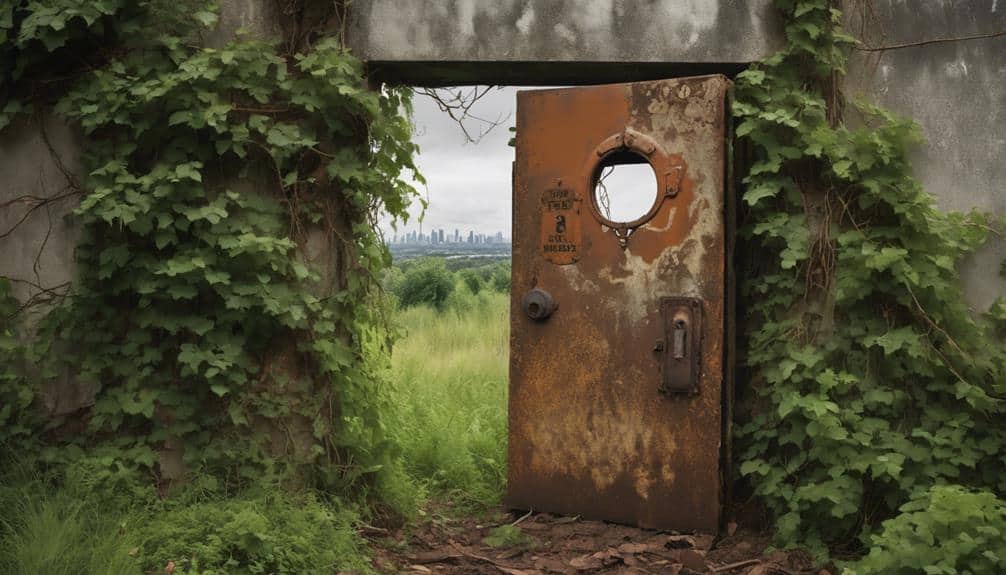You're probably aware that getting an abandoned house for free sounds too good to be true, but it's possible if you're willing to do the legwork. Start by researching local property laws and finding the rightful owner through public records or a title search. Verify the house is truly abandoned, then consider adverse possession – but be cautious, as this can lead to legal disputes. Meeting occupation requirements, like continuous and exclusive use, is also essential. Understand local laws, document every step, and establish open communication to avoid legal complications. There's more to uncover in the world of abandoned houses – keep exploring.
Key Takeaways
• Research local property laws and adverse possession criteria to understand the process of acquiring an abandoned house.
• Identify the rightful owner through public records, title searches, and neighborhood inquiries to initiate the acquisition process.
• Meet occupation requirements set by the state, including continuous and exclusive occupation, to establish a claim on the property.
• Document every step of the acquisition process to protect against legal challenges and establish a paper trail.
• Consult a real estate attorney familiar with adverse possession laws to ensure a smooth and legal acquisition process.
Researching Abandoned Properties
To increase your chances of successfully acquiring an abandoned house, start by researching local property laws to understand the regulations surrounding the acquisition of abandoned houses in your area. This knowledge will be essential in navigating the complex process of claiming ownership. As you explore the world of real estate, you'll realize that abandoned houses can be a goldmine for those with the right knowledge and skills.
First, identify the rightful owner of the property through public records or a title search. This will give you a clear understanding of the property's history and any outstanding debts or liabilities. If you're having trouble finding the owner, consider contacting neighbors or a title company for assistance. They may be able to provide valuable insights or connections that can help you track down the owner.
Before proceeding, verify the abandonment status of the house to make sure it's truly abandoned. This will save you time and resources in the long run. Remember to approach claiming abandoned houses with legality and caution to avoid any legal issues.
Understanding Adverse Possession

Now that you've identified a potential abandoned property, it's time to explore the possibility of acquiring it through adverse possession, a legal concept that allows individuals to claim ownership without paying for the property. This concept can be a game-changer for those looking to acquire a house without breaking the bank. But before you get started, it's important to understand the criteria for adverse possession.
| Criteria | Description | Importance |
|---|---|---|
| Open | Possession must be open and notorious, meaning it's visible to the public. | High |
| Hostile | Possession must be hostile, meaning it's without the owner's permission. | High |
| Continuous | Possession must be continuous, meaning it's uninterrupted. | Medium |
| Exclusive | Possession must be exclusive, meaning you're the only one occupying the property. | Medium |
Keep in mind that different states have varying time requirements for adverse possession, ranging from 5 to 30 years. It's important to consult a real estate attorney to understand the specific laws and requirements for adverse possession in your state. Adverse possession can be risky and may lead to legal disputes with the original property owner. However, with the right guidance, it can be a viable option for acquiring a property without paying for it.
Finding the Rightful Owner

You'll need to dig deep to uncover the identity of the rightful owner, and your first step is to scour local property records and tax assessments for clues. This will help you make informed decisions about the abandoned house and its potential for possession.
Online resources like county assessor websites or public records can provide valuable information, so be sure to utilize them in your search.
Additionally, consider reaching out to neighbors or nearby residents to gather any information they may have about the property's ownership. They might have valuable insights or knowledge about the house's history.
If you're struggling to find the owner, consider hiring a title company to help trace the title history and locate the current owner of the abandoned house. These professionals can help you navigate the complex process of finding the rightful owner.
Throughout this process, it's important to approach the search with caution and adhere to legal protocols to avoid any potential complications. Remember, your goal is to acquire an abandoned house for free, and finding the rightful owner is a critical step in achieving that goal.
Meeting Occupation Requirements

By occupying the abandoned house continuously and exclusively, you'll need to fulfill the specific occupation requirements set by your state, which can range from 5 to 20 years, to establish a successful adverse possession claim. To make this claim, you must demonstrate that you've openly and exclusively possessed the property without permission from the owner. Meeting the occupation requirements is important, as it's a key factor in successfully claiming an abandoned house through adverse possession.
To fulfill these requirements, you'll need to occupy the property continuously, without interruption. This means you can't leave the property vacant for extended periods or allow others to occupy it simultaneously. You must possess the property without permission from the owner, making an open and notorious claim to the property. It's crucial to understand the specific occupation requirements in your state, as they vary significantly.
Avoiding Legal Complications

To avoid getting entangled in a web of legal complications, it's vital that you understand the nuances of adverse possession laws in your local jurisdiction. You don't want to risk losing your claim to the abandoned house due to non-compliance with occupation periods or other requirements. Conduct thorough research to make sure you're meeting all the necessary criteria for adverse possession in your area.
It's also a good idea to consult with a real estate attorney who's familiar with adverse possession laws. They can guide you through the process and help you navigate any potential legal issues that may arise.
Additionally, try to establish open communication with the property owner, if possible. This can help prevent legal disputes and facilitate a smoother acquisition process.
Remember to document every step of the way, from your initial occupation to any interactions with the property owner or local authorities. This paper trail can protect you against legal challenges in the future.
Is it Possible to Get an Abandoned House for Free without Paying?
It’s not easy to find an abandoned house for free without politely saying pay your own way. Most properties come with taxes, liens, or other expenses. It’s essential to do thorough research and be prepared to invest in renovations and legal costs before taking on such a project.
Frequently Asked Questions
How Long Before Property Is Considered Abandoned in Texas?
You're wondering how long it takes for a property to be considered abandoned in Texas. Well, you should know that according to Texas laws, a property is considered abandoned if it remains unclaimed for three years.
This countdown starts when the owner leaves with no intention of returning or claiming the property.
Can You Claim an Abandoned House in Texas?
Did you know that Texas has over 300,000 abandoned homes?
Now, to answer your question: yes, you can claim an abandoned house in Texas. Through adverse possession, you can occupy the property for a continuous period, typically 10 years, and fulfill legal requirements to stake your claim.
However, it's important to research Texas property laws and consult with legal professionals to guarantee a smooth process.
How Do I Find Abandoned Houses in My Area?
You're on the hunt for abandoned houses in your area! Start by scouring online listings like Zillow or Realtor.com for properties in disrepair.
Take a drive around neighborhoods, keeping an eye out for overgrown yards, boarded-up windows, or piled-up mail.
You can also check with local government agencies or the county assessor's office for lists of abandoned properties.
What Are the Abandonment Laws in Texas?
You're looking to understand Texas' abandonment laws. Here's the lowdown:
Texas allows adverse possession, where you can claim an abandoned property under specific conditions.
You'll need to occupy the property for at least 10 years, pay property taxes, and provide proof of continuous, exclusive, and hostile possession.
It's a legal way to acquire abandoned properties, but you'll need to navigate the intricacies of Texas law to succeed.
Conclusion
You've made it through the process, and now you're on the verge of claiming an abandoned house for free. But before you pop the champagne, ask yourself: Are you ready for the responsibilities that come with homeownership?
From property taxes to maintenance, it's not all sunshine and rainbows. Still, if you're willing to put in the work, the reward can be a dream come true.


